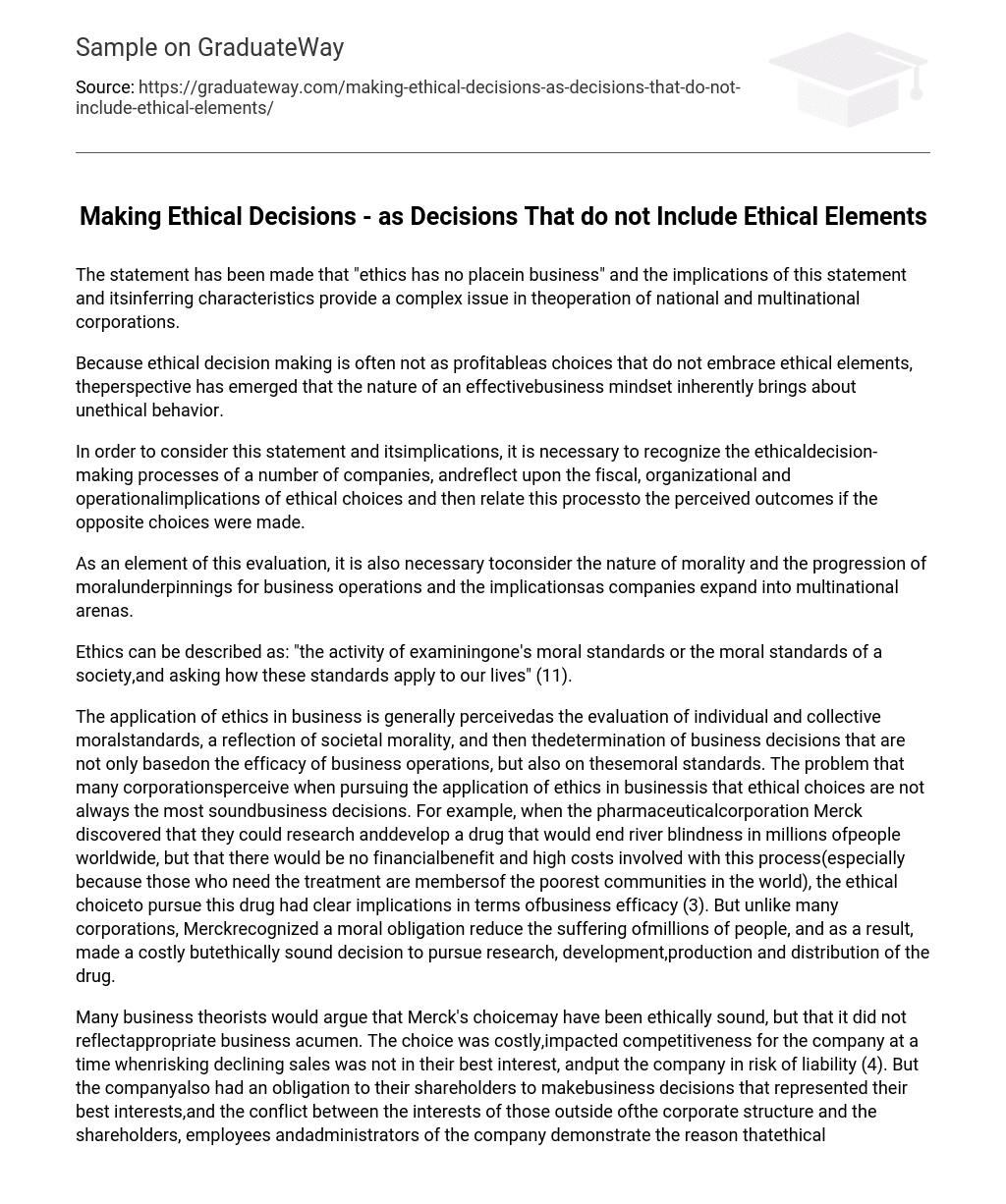The statement has been made that “ethics has no placein business” and the implications of this statement and itsinferring characteristics provide a complex issue in theoperation of national and multinational corporations.
Because ethical decision making is often not as profitableas choices that do not embrace ethical elements, theperspective has emerged that the nature of an effectivebusiness mindset inherently brings about unethical behavior.
In order to consider this statement and itsimplications, it is necessary to recognize the ethicaldecision-making processes of a number of companies, andreflect upon the fiscal, organizational and operationalimplications of ethical choices and then relate this processto the perceived outcomes if the opposite choices were made.
As an element of this evaluation, it is also necessary toconsider the nature of morality and the progression of moralunderpinnings for business operations and the implicationsas companies expand into multinational arenas.
Ethics can be described as: “the activity of examiningone’s moral standards or the moral standards of a society,and asking how these standards apply to our lives” (11).
The application of ethics in business is generally perceivedas the evaluation of individual and collective moralstandards, a reflection of societal morality, and then thedetermination of business decisions that are not only basedon the efficacy of business operations, but also on thesemoral standards. The problem that many corporationsperceive when pursuing the application of ethics in businessis that ethical choices are not always the most soundbusiness decisions. For example, when the pharmaceuticalcorporation Merck discovered that they could research anddevelop a drug that would end river blindness in millions ofpeople worldwide, but that there would be no financialbenefit and high costs involved with this process(especially because those who need the treatment are membersof the poorest communities in the world), the ethical choiceto pursue this drug had clear implications in terms ofbusiness efficacy (3). But unlike many corporations, Merckrecognized a moral obligation reduce the suffering ofmillions of people, and as a result, made a costly butethically sound decision to pursue research, development,production and distribution of the drug.
Many business theorists would argue that Merck’s choicemay have been ethically sound, but that it did not reflectappropriate business acumen. The choice was costly,impacted competitiveness for the company at a time whenrisking declining sales was not in their best interest, andput the company in risk of liability (4). But the companyalso had an obligation to their shareholders to makebusiness decisions that represented their best interests,and the conflict between the interests of those outside ofthe corporate structure and the shareholders, employees andadministrators of the company demonstrate the reason thatethical choices are not applied more freely in the businessarena. It can also be argued that by making ethicaldecisions in favor of drug development, that Merck was alsoinherently making unethical decisions in terms of theirobligation to the shareholders and the standards of behaviorbased in their agreed contractual relationship. Becausecorporations are primarily economic institutions, thequestion of whether they can be expected to apply moralstandards that risk their economic viability underscoreswhat some have argued is the oxymoronic element of “businessThis perspective has come into greater focus ascompanies turn to multinational expansion, and enter intocommunities with different standards for business operationand differing moral standards that determine ethicalbehavior in general. For example, the standards that areembraced in the United States in terms of child labor lawsmay not have the same implication in other countries, andthe question of child labor and its use has reflectedconflicting perspectives in terms of business ethics in themultinational firm. Is it more unethical to use childlaborers in countries where this is expected and acceptedpractice, and where children can assist in feeding theirfamilies, or is it more unethical to deny them employmentfrom the application of American visions of morality andstandards for ethics. As more and more companies pursuemultinational expansion as a means of reducing their overallcosts, utilizing cheap labor forces and less stringent legalrequirements, the question of the decline of business ethicsand the application of an American notion of morality isclearly problematic to the argument at hand.
Multinational corporations often make the determinationfor expansion into other countries because they can takeadvantage of lower taxes, fewer legal and socialconstraints, and favorable environments, companies oftenenter international development without a concern forethical determinations in their business operations. It hasbeen argued that the moral difference between countriesinherently maintains the ethical process for companies asthey relate to the ethics of each society they enter (forexample, child labor, cheap labor, subjugation of workers,are all elements that might be accepted in the workforce ofArab nations, for example, and might direct expansion intothis area). But it has also been argued that businessethics are not driven by relativism to the community inwhich the business expands, and that multinationalcorporations cannot look to the individual characteristicsof the communities they expand into to drive their ethicalBusiness theorists often argue that there is not placefor ethics in business decisions, based on the perspectivethat ethical choices often reflect little consideration forwhat is in the best economic interest of a company. But tosay that there is no means of bringing together ethicalchoice and business efficacy is a limited perspective on theissue as a whole. Individuals have a moral responsibilityto take ethical action, and there is no way of denying thatcorporations are made up of individuals attempting to makeboth business and ethical determinations.
Business ethics, then, must focus not only on theissues related to preventing harm to others, but also takingaction that negates the passive process of allowing harm tohappen. In the example of Merck, the company pursued theirethical choice not because they would be causing harm ifthey did not make this determination, but because if theydid not take this action, they would be allowing harm tooccur (48). Though it cannot be expected that every companywill take this kind of action, at the very least,corporations, both national and multinational, have todetermine operational ethics that prevent them from causingBibliography:





